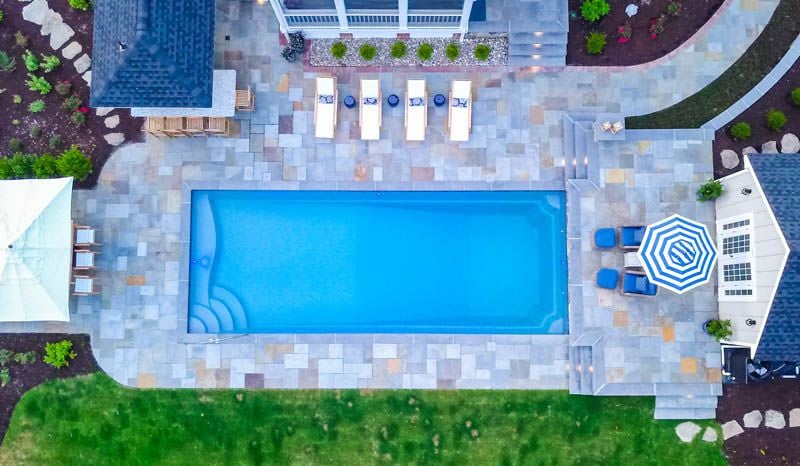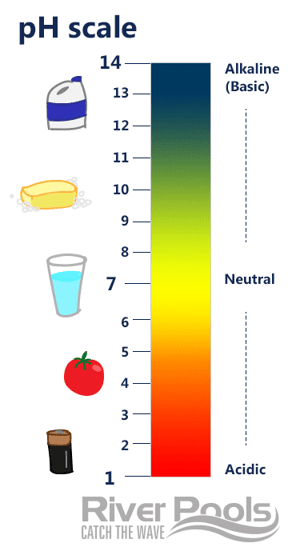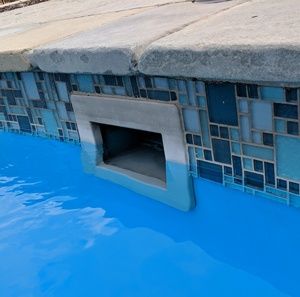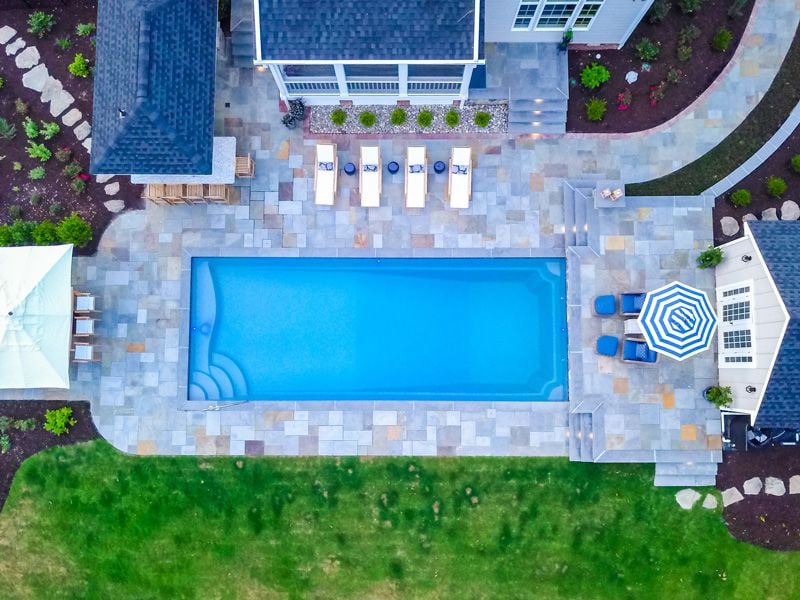
What Is the Life Expectancy of a Fiberglass Pool?
Fiberglass Pool Information | Pool Maintenance
Fiberglass pools are durable, low maintenance, and they have the fastest installation of all inground pools, but you might still be asking, “What is the life expectancy of a fiberglass pool? How long should a fiberglass pool last?"
Great questions.
At River Pools, we manufacture, install, and service fiberglass swimming pools across North America, so we get these questions all the time. To give you an idea of the expected fiberglass pool lifespan, we decided to write this article explaining how long your pool will last as well as how you can preserve and extend the life of your fiberglass pool.
Let’s dive in.
How long do fiberglass pools last?
A fiberglass pool can last well over 50 years if it’s a good quality pool. How do you know if your fiberglass pool is good? Two main things: the manufacturer is reputable, and the installation is done properly.
The manufacturer of your pool should use high-quality materials and inspect each pool shell thoroughly before shipping it out. The pool also needs to be installed with precision and care to prevent spider cracks and other problems in the future.
See how we install our pools the River Pools Way to keep the pool intact and prevent future problems.
How to maintain your fiberglass pool
The lifespan of your fiberglass pool will also depend on how well you take care of it. This is something that is true for every pool, no matter what kind you have.
One of the most important parts of this is maintaining the chemical balance. Your pool’s pH levels should be somewhere around 7, right in the middle of the pH scale.

Make sure to test these levels regularly because chemical imbalance can harm your pool and your cleaning equipment. Read more about this in our full guide on testing your pool’s water chemistry.
Pro tip: Don’t use any harsh chemicals that aren’t appropriate for fiberglass. They can wear down the gelcoat and shorten the life of your pool’s surface.
You also need to run the pool filter to keep the pool clean. Luckily, fiberglass pools only need one circulation per day, which saves money and energy. Concrete pools require two circulations per day which can add up to a lot of additional energy over time.
Finally, make sure to keep the water at an appropriate level to balance the upward pressure of any groundwater that may be beneath the pool.
We recommend that you always keep the water level one-third of the way to halfway up the skimmer (the little box on the side that catches debris), and never drain your fiberglass pool. If you need to drain your pool for any reason, consult with a professional first.

See our full guide on proper fiberglass pool maintenance for more details.
How does fiberglass compare to other pool types?
Concrete pools need to be professionally cleaned regularly and refinished every 10 years or so. Specifically, they need chemicals to control algae, acid washing every 3-5 years, and replastering or otherwise resurfacing every 10-15 years. This can add up to $27,000 or more.
If you have a vinyl pool, the vinyl lining needs to be replaced every 5-9 years, and that alone costs around $4,500 on top of chemicals, electricity, and other maintenance costs (an additional $7,000).
With fiberglass pools, you pretty much only have to pay for chemicals and electricity, which may cost you around $4,000 total within a 10 year period. Compared to concrete and vinyl liner pools, fiberglass pools cost much less to own and you can do most of the maintenance yourself.
Read our in-depth guide comparing fiberglass, vinyl liner, and concrete pools for more details.
Do fiberglass pools need refinishing?
Maintaining a swimming pool can be hard work. For some people, it’s a full-time job. With fiberglass pools, you’re looking at very minimal maintenance compared to other types of swimming pools.
A fiberglass pool will eventually need to be refinished later down the line, but that’s certainly not something to worry about when buying your pool. In fact, your pool should be at least 20 or 30 years old before you see a need for refinishing.
Sometime after the 20 or 30 year mark, you might need to retouch or completely refinish your pool’s surface. This is obviously not something that you will do by yourself, so you’re going to have to call in a professional to get this job done.
(Read more about refinishing a fiberglass pool here.)
While refinishing your fiberglass pool won’t be an easy DIY project, let’s put into perspective how much less work that is compared to the other types of pools:
- Concrete pools need acid washing and replastering in less than half that time, which can cost over $10,000.
- Vinyl pool liners are easy to tear and can cost a small fortune to replace (over $4,000).
Meanwhile, fiberglass pools have a durable gelcoat that can go a few decades without refinishing.
What wear can you expect to see on your fiberglass pool?
While there shouldn’t be any major changes in your pool, the bright color may start to fade (this also depends on the pool color). This is natural considering your pool sits out in the sun. However, the fading is very even and gradual, and you probably won’t notice it.
If you purchase the pool from a quality manufacturer, have it installed properly, and take care of it, you shouldn’t have any major issues with your fiberglass pool. However, like all swimming pools, we know that fiberglass pools can encounter unforeseen problems.
To learn more about this, read about the top 5 fiberglass pool problems and how to fix them.
How to extend the life of your fiberglass swimming pool
To give you a quick recap, here are the things that you can do to preserve and extend the life of your fiberglass pool:
- Don’t use any harsh chemicals not made for fiberglass pools
- Keep the pool clean and use a pool cover when necessary
- Maintain the chemicals at the proper levels
- Run the pool filter at least one cycle per day
- Keep the water level about halfway up the skimmer
- Never drain your fiberglass pool

A fiberglass pool is truly your best option if you're looking for a durable, low-maintenance swimming pool with minimal lifetime costs. If you buy a high-quality pool and take care of it properly, it should last as long as you need it to.
At River Pools, we manufacture, install, and service world-class fiberglass pools across North America. We have a wide selection of models of all shapes and sizes, including small pools for small backyards and large pools that are over 8 ft. deep.
Check out our pricing guide today, try out our fiberglass pool cost calculator, or request a custom quote to get started.
Before you go, don't forget to download our free ebook below discussing the differences between the three main types of inground swimming pools.
Up Next:
How Much Time Does It Really Take to Maintain a Fiberglass Pool?
How Deep Are Fiberglass Pools?
Ultimate Pool Planning Guide: 11 Things to Consider Before Installing an Inground Pool





